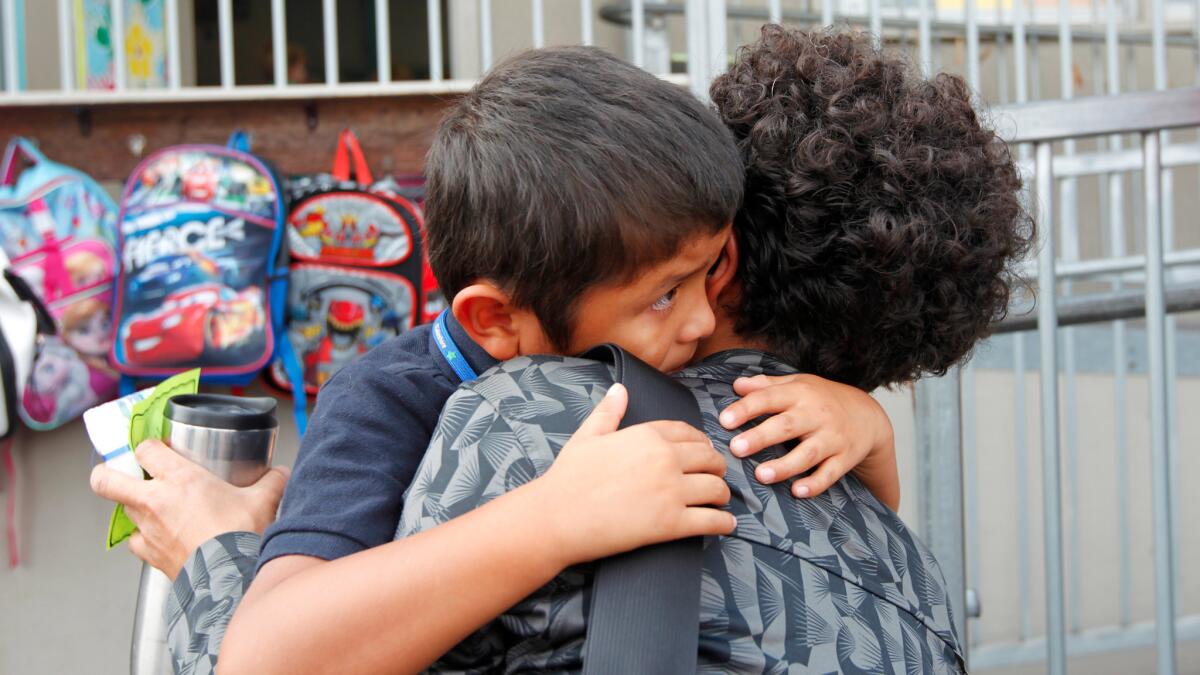California’s parents don’t know they have a voice in school spending decisions

- Share via
Parents in California have a right to help decide how their schools spend money, but many in the state may not know that.
Researchers from the University of Southern California’s Rossier School of Education and Stanford University’s Policy Analysis for California Education found that more than half of voters they polled had never heard or read about the Local Control Funding Formula.
In 2013, California passed the LCFF, a school finance law designed to distribute money based on an amount per student plus more for those who need extra help.
The money came with strings. Districts got more control over how they spent it, but they had to develop Local Control Accountability Plans, detailed school improvement plans that focus on more than test scores.
Gov. Jerry Brown hailed the law as fairer than the system it replaced. One of its eight priorities is parent engagement. Specifically, districts and schools must “promote parental participation” in special-needs programs and include parents in decisions concerning spending.
But according to the poll, released Thursday, few voters and parents are aware of this.
Sixteen percent of respondents said they had heard of the formula, and 54% said they had not. Still, after respondents read a description of the law, 71% reported they supported the approach.
Only 5% of voters said they attended meetings related to setting goals or funding decisions — and only 11% were aware that they were taking place. But more than 60% of those polled said they were interested in participating.
The poll, conducted from Aug. 23-30, measured 1,202 registered voters, but one of the researchers behind it, USC associate professor of education Morgan Polikoff, said the responses of those who were parents did not differ significantly from those of the group as a whole in terms of the awareness of the LCFF.
The awareness of the law is “stunningly low,” Polikoff said. “It’s really troubling for a policy that relies on local awareness and contribution.” And awareness appears to have barely increased over time.
It’s possible that few parents know about ways to provide input because of a lack of outreach from school districts, Polikoff said. Or maybe, said Ryan Smith, executive director of the advocacy group The Education Trust-West, districts should engage in a different way.
“In order for parents to understand LCFF, we have to do more than sit and [hold] ... meetings where they get information,” said Smith. “We have to meet them where they are in their communities.”
Smith noted that a previous poll, conducted by the Public Policy Institute of California in 2014, found 27% of adults and 37% of public school parents had heard about the funding formula. A more recent version of the PPIC poll, conducted in 2016, found that 30% of adults and 36% of parents had heard of it.
The poll comes as the California State Board of Education finalizes its revamped school rating system. The board voted Thursday on a new rubric for evaluating schools under the local funding law, using a combination of factors including test scores, graduation rates and level of college preparedness.
The poll asked respondents how they would rate performance in the state’s public schools in recent years. While 19% of parents said they thought California’s schools have improved, 39% said they have gotten worse — and 39% said they stayed the same.
The poll also found strong support for teachers, a timely topic in light of the recent failed lawsuit, Vergara v. California, that attempted to upend teacher tenure. Seventy-one percent of those polled said they would encourage a young person to become a teacher — and 95% of those who responded that way said they did so because of teachers’ “ability to make a difference in the lives of children.”
Thirty-five percent percent of those polled said they had children under 18 living at home. Fifty-eight percent were white, 24% were Latino, 8% were Asian and 5% were black. The margin of error was 2.83%.
You can reach Joy Resmovits on Twitter @Joy_Resmovits and by email at [email protected].
MORE EDUCATION NEWS
These magnets have become some of L.A.’s highest-scoring public schools
Black-focused housing at Cal State L.A. draws criticism, but it’s nothing new
San Francisco school board president calls for the renaming of schools tied to slavery
UPDATES:
8:40 a.m.: This story was updated to include information from the 2016 Public Policy Institute of California education poll.
This post was originally published at 8 a.m.
More to Read
Sign up for Essential California
The most important California stories and recommendations in your inbox every morning.
You may occasionally receive promotional content from the Los Angeles Times.











